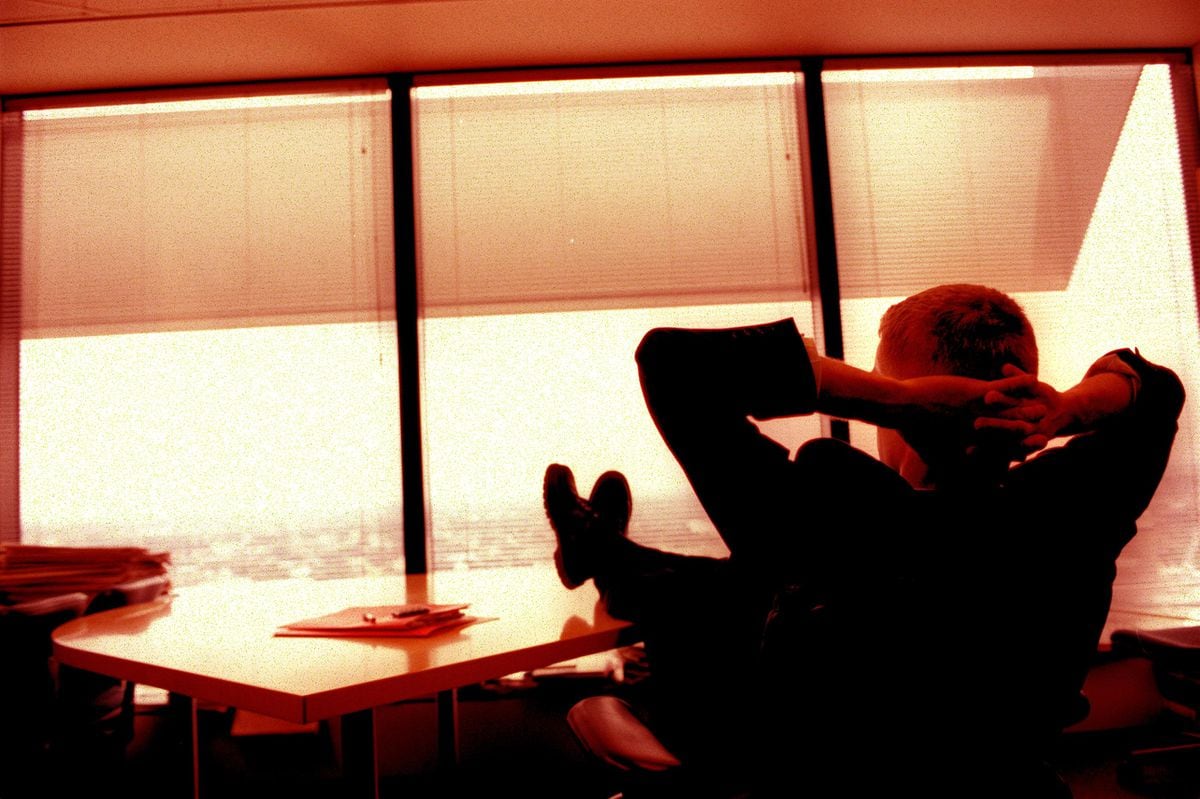The story of the women and men who have long been hiding at work is reminiscent of that of Shoichi Yokoi, a sergeant in the Imperial Japanese Army who spent nearly 30 years hiding in the jungle of Guam, the Mariana archipelago, after World War II. Yokoi decided not to surrender until he received direct orders from a superior and went into the thicket, feeding on toads, rodents and snakes and striving to go unnoticed. His plan, an act of stubborn lone resistance, worked. No one could find Sergeant Yokoi until, one spring day in 1974, he got fed up with hiding.
An article by Emily Stewart on the American website Vox warns about the existence of laggards of contemporary corporate wars who manage to hide for years in the thicket of their own companies. Stewart describes them as "wage earners out of work." In Spain, extreme cases have transcended such as that of the Valencian civil servant Carles Recio, world record holder in the discipline of squeezing the lump, who spent a whole decade going to work only to sign first thing in the morning without recording in all that time the realization of any specific task.
More informationLittle adaptation, a lot Tinder: the digital nation project for teleworking nomads that is tested in a Portuguese village
In Stewart's opinion, "the pandemic, teleworking, the process of automation and outsourcing of workloads and the organizational mess that all this is generating in some companies" are now breeding grounds for the proliferation of a new batch of Yokoi Sergeants in the world of work. The journalist believes that this type of passive resistance and professional absenteeism has always existed, but perhaps now more than ever. Most of them started out practicing part-time skimming, but over time they have perfected their strategies of indolence and camouflage to become an absent presence: they go to work, but they don't work.
You work, it makes me laugh
Alison Green, author of the hilarious corporate disaster essay Ask A Manager: How to Navigate Clueless Coleagues, Lunch-Stealing Bosses and the Rest of Your Life At Work, believes that the existence of these types of job profiles is a phenomenon "as disconcerting as it is frequent." In most workforces, workloads are distributed inefficiently and even less evenly and logically: "The stronghold of more engaged and motivated professionals takes on the bulk of the important tasks while a silent majority weathers the storm trying to do as little as possible and a last group manages to do nothing at all."
Palmerston, the official mousehunter of the Foreign and Commonwealth Office (FCO) in London, fails to perform his duties sleeping on a sofa. Richard Baker (In Pictures via Getty Images)
Cristian S., a 43-year-old computer scientist from Barcelona, belongs, as he confesses, to that third group, that of the "toxic survivors", in the words of Green. Cristian agrees to speak with ICON on the condition that his anonymity be preserved. He acknowledges, from the outset, that he has spent more than four years dedicating himself to "wasting time" and without making any significant contribution to his company: "Let's say I get paid and spend a minimum of 40 hours a week in my office, but I have no job since I completed the redesign of the internal servers a few months before the pandemic."
Shortly after, the company in which he works was absorbed by another and the new owners decided to outsource computer assistance: "I was retained to take charge of the coordination and supervision of that external service, but the reality is that there is nothing to supervise or coordinate, my supposed interlocutors never contact me and my bosses do not seem to know that I exist. "
As soon as the confinement began, Cristian settled definitively in the Nirvana of well-paid inactivity. He soon got into the habit of opening his corporate email account first thing in the morning and spending the rest of the day doing "absolutely nothing": "In October 2020, when I was ordered to rejoin the office after leaving behind a period of discretionary transition that I extended as long as I could, I thought I would be fired almost immediately, as soon as they realize I have nothing concrete to do."
They have forgotten about me
But it didn't happen. He was assigned an office "in the catacombs of the company", in an underground plant that he describes as "ground zero of the last massive layoffs, because right now I am surrounded by empty offices, the nearest colleague is about 20 meters away". There he has built his castle, which he refers to as "Villa Soledad", in memory of the Arctic refuge of Superlópez. He acknowledges that he spends hours "smoking, walking, drinking coffee, watching movies and series, listening to music" and even hiding or dozing in the bathroom, one of the favorite corners of his particular jungle of Guam.
He has no illusions: he believes that he will be "found" sooner or later. And when that happens, he only hopes to get a dismissal in "dignified" conditions, without being forced to give explanations or receive reproaches: "After all, the company, especially my theoretical direct supervisors, is at least as much to blame as I am." He is not proud of his permanent sit-down strike, but attributes it "above all" to the incompetence and lack of judgment of the new owners. He feels "cornered", but admits that his situation does not respond to any type of workplace harassment measure: "They have simply forgotten me. And I have contributed, due to lack of motivation or discouragement, to make it happen."
'The Siesta', by Vincent Van Gogh (1889 - 1890). Getty Images
At this point, Cristian completely rules out exposing his case to the management or the human resources department: "Maybe it would have made sense to take such a step three years ago, but if I did it now I would be forced to answer many uncomfortable questions and for which I have no satisfactory answer, it is evident that I have been receiving a fairly generous salary for doing nothing for a long time. "
Divorce and anxiety
Cristian adds, in case there was any doubt about it, that his does not seem to him an enviable situation at all. In this period of absent presence in his office, he has divorced ("although I must say that our problems of coexistence as a couple already came from before") and suffers increasingly habitual anxiety attacks. Doing nothing, he says, "takes its toll." In spite of everything, he is reluctant to ask for sick leave, something that in his situation would be perfectly logical. As he tells us, he has developed a kind of superstitious attachment to his office, his "little armchair". In it he feels "protected". Although she has considered looking for work, she actually feels unable to adapt to a new corporate environment. He has become accustomed to a life that he himself considers "absurd and empty."
Something similar is happening to Daniel M., 59, an intermediate position in a Madrid communication company where he has been working since 1993. Daniel agreed to the elusive condition of salaried employee without work as a result of a tacit pact: "A few years ago I was among the three candidates for a promotion, but the company ended up choosing a newcomer who had finished training with me and with whom I have no personal or work harmony. " A few months later, his new boss suggested that Daniel be fired or transferred to another department: "But the director of human resources told him that this was unfeasible, that my seniority and my salary entitled me to compensation that the company is not willing to assume."
Thus began a long period that Daniel refers to, not without bitterness, as "my stay at the spa": "Unless we end up reaching an agreement that today seems very unlikely, I will stay here until I retire. It mortifies me, of course, that in a company where almost everything is to be done, nobody wants to use my knowledge and experience. But my routine is very placid. I have a television in my office, I can spend my dead hours reading the sports press and there are still comrades of the old guard with whom to chat, eat, have breakfast and even have a snack."
Daniel attributes his anomalous fit into the corporate structure to the "lack of honesty and common sense" of his superiors. He believes that they should fire him and compensate him as he deserves or return to his services He assures that he has never refused to perform any of the tasks (increasingly sporadic) that are still assigned to him: "I cannot stand condescension, to be treated like an old piece of furniture, as if I were not capable of doing my job, when the truth is that I stay healthy, informed and intellectually active, and I could continue to make a valuable contribution if asked." Of course, he rules out seeking new professional horizons: "I am not willing to lose this pulse. I have acquired rights and I am going to defend them. I won't leave here without a good check in my pocket. Besides, who was going to hire me, at this point, in serious and dignified conditions?"
A relaxed man in his office in the seventies.H. Armstrong Roberts/ClassicStoc
More peculiar is the case of Clara G. and Carlos M., responsible, at 36 and 41 years old, for a "ghost" department of strategic marketing (in a financial company) whose services nobody has used for "more than two years". Clara jokes that "Carlos and I are a kind of clandestine guard pharmacy where no sick person goes anymore, perhaps because we have been moved to a lonely and dark alley."
How did this situation come about? Carlos says that in a "gradual" way, as happens to "those frogs that cook over low heat, gradually raising the temperature of the pan, and stay still until they are chipped". Clara and Carlos began to perceive at the time of rejoining their positions after the pandemic that the revamped management of their company "did not really need a strategic marketing department, but wanted to keep it, for an absurd matter of corporate prestige". So they were exhorted, informally, to "go to the reserve." That is, to stay available, but without attracting much attention.
Both were granted permission to do up to 80% of their workday from home. The only active supervision measure to which they are subject, apart from the face-to-face meetings of the entire marketing team that are usually convened on Tuesdays and Wednesdays, is the delivery of a series of periodic reports on the evolution of their business area that are, according to Clara, "a continuous headache, because it is frankly complicated to explain what you do when the reality is that you do nothing". "Basically, it is still a procedure empty of content," adds Carlos not without some sadness, "the recipients of these reports are the first to know that our business area does not evolve at all, because they have decided to do so."
Both assume that they will end up being fired "sooner or later" and that no one will miss their spectral strategic marketing department. In a sense, they are looking forward to it. Like Sergeant Yokoi, they feel the time has come to stop hiding. Clara, in spite of everything, argues her position with the serene resignation of the one who knows himself judged (and condemned) in advance: "How do you give up a salary of more than 50,000 euros per year just because your bosses have decided that they do not know what to do with you, but, even so, they do not want to fire you? We are good professionals, we are perfectly qualified to propose ideas that would create value. But to sell something you need someone to want to buy it from you."
Carlos acknowledges that he has "accommodated" to his anomalous situation: "It allows me to enjoy my leisure, my friends, my family. I had been enduring strenuous workloads for 15 years, because my career had always been the top of my priorities. Somehow, I needed to slow down. And circumstances have allowed me to do it while collecting a good payroll."
For Emily Stewart, however anecdotal cases such as those cited are, they can be interpreted as symptoms of how dysfunctional much of the current corporate structures are: "Companies tend to structure themselves in an unnecessarily complex way and that creates the loopholes and areas of darkness in which unmotivated, unscrupulous professionals hide, or, simply, allergic to work." In neglected gardens, parasitic plants often proliferate.
Perhaps the most curious thing is that the scandalous lack of productivity of those who have decided not to give a stick to the water passes, in some cases, completely unnoticed. For Stewart, this is because "many of his colleagues follow the corporate rules to the letter and end up developing a frenetic activity, but so superfluous and so badly oriented that deep down it hardly creates tangible value." In other words, it is the messy and sterile hustle and bustle of much of the templates that makes the absent presence of a few end up going unnoticed. Some of those who do work do so badly (or in such a misguided way) that you don't even notice the difference.
Daniel ends his speech with a phrase that exudes cynicism, perhaps not entirely voluntary: "My years of spa with payroll have ended up being a perfect training for retirement. When I finally retire, I will go and do at home exactly what I do now in the office."
You can follow ICON on Facebook, Twitter, Instagram, or subscribe here to the Newsletter.




/cloudfront-eu-central-1.images.arcpublishing.com/prisa/PZPEEEUGKRCO3JJYTV72EIJGLM.JPG)




